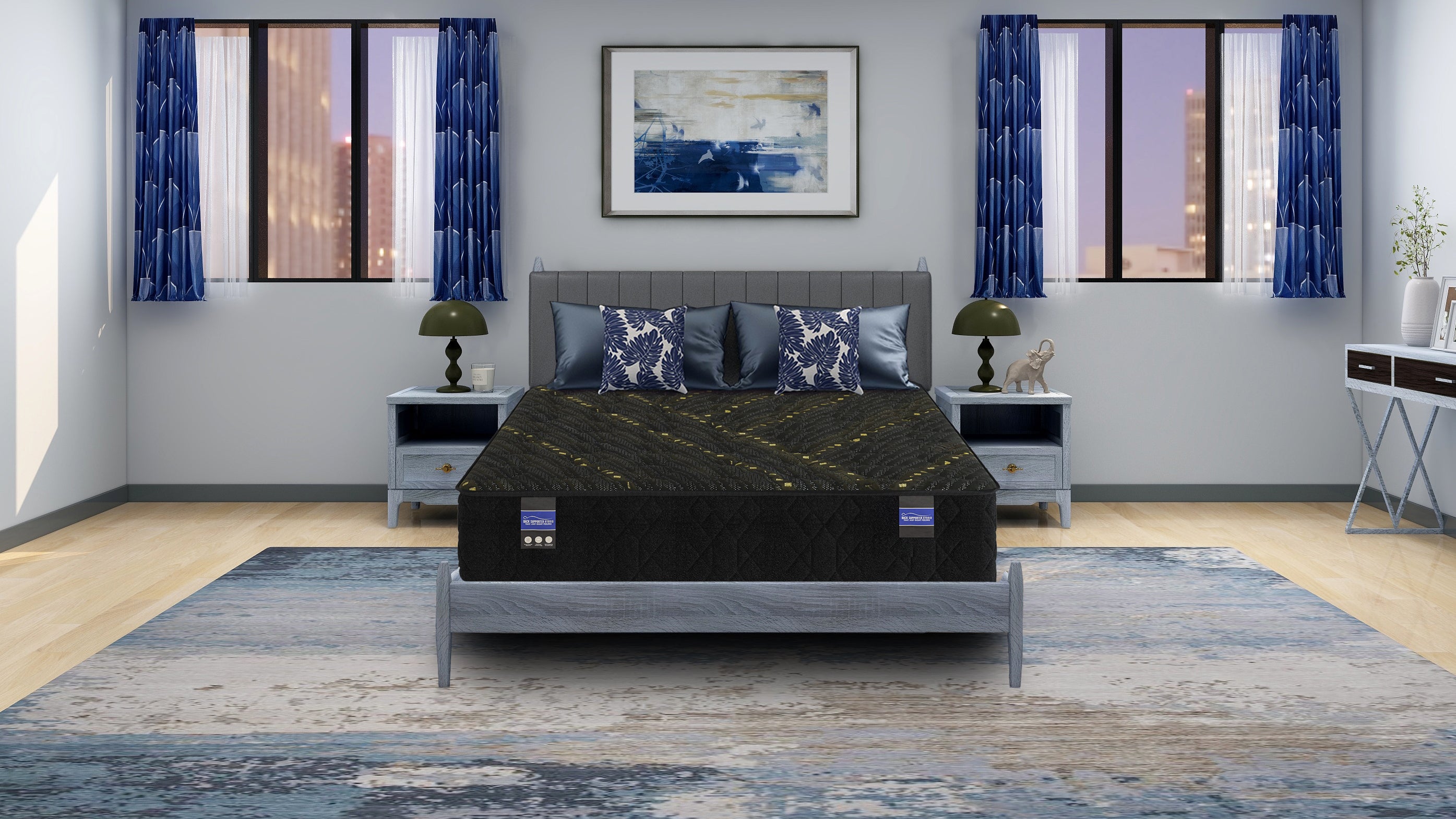Spring Sale - Save on Back Supporter!
Popular Products
- From $1,099.99
$1,179.99- From $1,099.99
- Unit price
- / per
- From $2,199.99
$2,199.99- From $2,199.99
- Unit price
- / per
- From $2,299.99
$2,299.99- From $2,299.99
- Unit price
- / per
Popular Products
Vendor:
Spring Air
Back Supporter Francesca Firm
3 reviews
Back Supporter Hybrid Francesca Firm is designed to contour and support with precision, ideal for sleepers who want comfort without compromise. Featuring a stretch knit cover and 875 individually wrapped coils, this mattress responds to movement while maintaining stable support. Proudly made in the...
- From $1,099.99
$1,179.99- From $1,099.99
- Unit price
- / per
Vendor:
Spring Air
Copper Hybrid Firm Eurotop
2 reviews
Copper Hybrid Firm Eurotop is engineered for consistency and freshness, using copper infused materials and carefully layered support systems to encourage cooler and cleaner rest. The top layer features a NatuVerex Copper Infused Cooling Cover that encourages airflow and resists microbial buildup. Beneath, performance...
- From $2,199.99
$2,199.99- From $2,199.99
- Unit price
- / per
Vendor:
Spring Air
Copper Foam Medium
2 reviews
Copper Foam Medium pairs the natural cleanliness of copper with responsive comfort layers that help manage heat and provide calm, undisturbed sleep across all positions. The NatuVerex Copper Infused Cooling Cover promotes cooling airflow and clean rest. Below, comfort layers respond to pressure zones...
- From $2,299.99
$2,299.99- From $2,299.99
- Unit price
- / per
Popular Products
- From $1,099.99
$1,179.99- From $1,099.99
- Unit price
- / per
- From $2,199.99
$2,199.99- From $2,199.99
- Unit price
- / per
- From $2,299.99
$2,299.99- From $2,299.99
- Unit price
- / per
Popular Products
- From $1,099.99
$1,179.99- From $1,099.99
- Unit price
- / per
- From $2,199.99
$2,199.99- From $2,199.99
- Unit price
- / per
- From $2,299.99
$2,299.99- From $2,299.99
- Unit price
- / per
Sleep Tips: 10 Expert-Backed Ways to Wake Up Refreshed
Quick Take
- Keep the same wake‑up and bedtime—even on weekends
- Power down screens and practice a wind‑down ritual
- Cool, dark, quiet bedrooms (60‑67 °F) promote deeper sleep
- Supportive mattresses & pillows matter more than you think
- Curb caffeine after 2 p.m. and skip night‑caps
- Move your body daily but finish vigorous workouts 2 h before bed
- Morning sunlight, dim evening light = a happy circadian clock
- Try 4‑7‑8 breathing or body‑scan relaxation
- Nap smart: 10‑20 min, early afternoon only
- Persistent sleep troubles? Talk with a sleep specialist
1. Stick to a Consistent Sleep Schedule
Going to bed and waking up at the same times—even on weekends—keeps your internal clock steady, making it easier to fall asleep and wake up naturally. Adults who keep a stable schedule report better rest and daytime energy.
Actionable steps:
- Choose a target wake‑up time and count back 7–9 hours for bedtime.
- Use your phone's "bedtime" or "wind‑down" mode to remind you 30 minutes prior.
2. Create a Wind‑Down Routine & Power‑Down Screens
A 30‑ to 60‑minute pre‑sleep ritual signals your brain that it's time to slow down. Reading on paper, gentle stretches, or a warm shower can all help. Aim to shut off bright screens at least 30 minutes before lights‑out to avoid blue‑light‑driven melatonin delays.
3. Optimize Your Bedroom Environment
Temperature: The sweet spot is 60‑67 °F (15.6‑19.4 °C). Cooler rooms help your core temperature drop, a cue for sleep onset.
Light & Noise: Use blackout shades, silence notifications, and consider white‑noise machines or earplugs if external noise is an issue. Both darkness and quiet reduce unwanted awakenings.
4. Invest in the Right Mattress & Pillow
A sagging or unsupportive sleep surface can trigger micro‑awakenings and next‑day aches. Upgrading to a mattress that matches your firmness preference and body type is a proven way to improve sleep quality—and longevity of deep sleep stages.
Need an upgrade? Explore Spring Air's lineup of supportive, pressure‑relieving mattresses designed for every sleeper profile.
5. Watch Your Late‑Day Intake (Caffeine, Alcohol, Heavy Meals)
Caffeine: Cut off coffee, energy drinks, and soda eight hours before bed (about 2 p.m. for a 10 p.m. lights‑out) to avoid stimulant effects at bedtime.
Alcohol: Night‑caps may help you doze off but fragment REM sleep and leave you groggy. Finish your last drink at least three hours before bed—or skip it.
Meals: Large, spicy, or high‑fat dinners within two hours of bedtime can cause reflux and sleep disruption. Opt for lighter fare in the evening.
6. Move Your Body—But Time It Right
Regular moderate‑to‑vigorous exercise shortens sleep‑onset latency and extends deep sleep. Finish intense workouts one to two hours before bed so body temperature and adrenaline can fall.
7. Leverage Light Wisely
Bright natural light in the first hour after waking strengthens your circadian "wake" signal, while dimming household lights two hours before bed supports melatonin release.
Tactics:
- Open curtains or step outside for 10 minutes each morning.
- Use warm‑tone bulbs (<2 700 K) and dimmers after sunset.
8. Try Evidence‑Based Relaxation Techniques
Deep‑breathing methods (e.g., 4‑7‑8), progressive muscle relaxation, and mindfulness scans calm the nervous system and reduce sleep‑onset time. Even 10 slow belly breaths can cue relaxation.
9. Nap Smart (If You Nap at All)
A 10–20‑minute "power nap" early‑to‑mid‑afternoon boosts alertness without entering deep sleep. Napping later or longer can interfere with nighttime rest.
10. Know When to Seek Professional Help
If you still struggle to fall or stay asleep, experience excessive daytime sleepiness, or rely on sleep aids most nights, consult a physician or board‑certified sleep specialist. Untreated disorders such as insomnia, sleep apnea, or restless‑legs syndrome can impact health and safety.
Final Thought
Healthy sleep is a foundation for immunity, mood, weight regulation, and long‑term wellness. By dialing in these 10 evidence‑based habits—and pairing them with a mattress built for comfort and support—you'll be well on your way to deeper, more restorative rest. Sweet dreams from the Spring Air team!
- Choosing a selection results in a full page refresh.
Thanks for subscribing!
This email has been registered!
Shop the look
Choose Options
Edit Option
Back In Stock Notification
Popular Products
Vendor:
Spring Air
Back Supporter Francesca Firm
3 reviews
Back Supporter Hybrid Francesca Firm is designed to contour and support with precision, ideal for sleepers who want comfort without compromise. Featuring a stretch knit cover and 875 individually wrapped coils, this mattress responds to movement while maintaining stable support. Proudly made in the...
- From $1,099.99
$1,179.99- From $1,099.99
- Unit price
- / per
Vendor:
Spring Air
Copper Hybrid Firm Eurotop
2 reviews
Copper Hybrid Firm Eurotop is engineered for consistency and freshness, using copper infused materials and carefully layered support systems to encourage cooler and cleaner rest. The top layer features a NatuVerex Copper Infused Cooling Cover that encourages airflow and resists microbial buildup. Beneath, performance...
- From $2,199.99
$2,199.99- From $2,199.99
- Unit price
- / per
Vendor:
Spring Air
Copper Foam Medium
2 reviews
Copper Foam Medium pairs the natural cleanliness of copper with responsive comfort layers that help manage heat and provide calm, undisturbed sleep across all positions. The NatuVerex Copper Infused Cooling Cover promotes cooling airflow and clean rest. Below, comfort layers respond to pressure zones...
- From $2,299.99
$2,299.99- From $2,299.99
- Unit price
- / per
Popular Products
- From $1,099.99
$1,179.99- From $1,099.99
- Unit price
- / per
- From $2,199.99
$2,199.99- From $2,199.99
- Unit price
- / per
- From $2,299.99
$2,299.99- From $2,299.99
- Unit price
- / per
Popular Products
- From $1,099.99
$1,179.99- From $1,099.99
- Unit price
- / per
- From $2,199.99
$2,199.99- From $2,199.99
- Unit price
- / per
- From $2,299.99
$2,299.99- From $2,299.99
- Unit price
- / per







